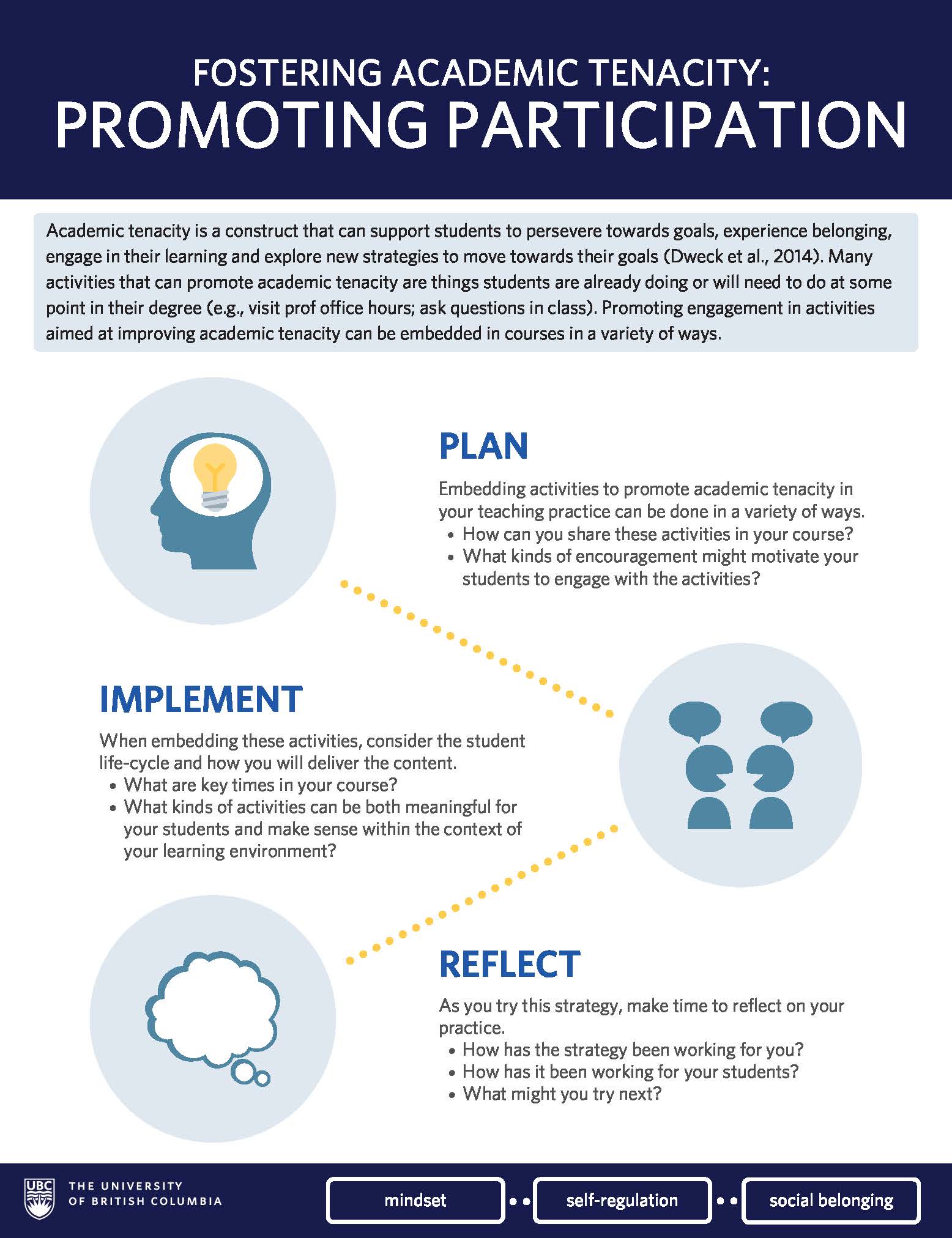Fostering Academic Tenacity through Promoting Participation
Promoting participation in activities that foster growth mindset, belonging and self-regulation.
Academic tenacity is a construct that can support students to persevere towards goals, experience belonging, engage in their learning, and explore new strategies to move towards their goals (Dweck et al., 2014). Many activities that can promote academic tenacity are things students are already doing or will need to do at some point in their degree (e.g., visit prof office hours; ask questions in class). Promoting engagement in activities aimed at improving academic tenacity can be embedded in courses in a variety of ways.
Promising Practice
Karen Smith teaches and coordinates BIOL 112, a first year biology course. She incorporates wellbeing teaching practices in her first-year classes to support students’ mental and physical wellbeing. In a first year biology course Karen launched the Academic Scholars Program. The Academic Scholars Program (ASP) is a course-embedded program that encourages students to participate in activities aimed at improving their academic tenacity. Engagement in these activities are acknowledged with participation marks. The ASP exposes students to a variety of activities and behaviors that model academic scholarship, provides incentives for students to engage in activities to develop a foundation for academic success and provides students with opportunities to explore and reflect on different strategies that may help them self regulate their learning.
The impact of the ASP activities was assessed with a key question in mind: Do students experience a change in their perceptions and abilities of self-efficacy, acquire academic success strategies, and participate in campus activities and resources?
Key findings include:
- Students who participated in the ASP were very likely to recommend it to other students.
- Participants in the ASP reported greater improvements compared to other students in areas such as awareness of their own mental health, access to academic resources, and involvement in campus life.
- They were also more likely to discuss their goals with faculty.
Selected References and Measures
- Dweck, C. S., Walton, G. M., Cohen, G. L., & Bill and Melinda Gates Foundation. (2014). Academic tenacity: Mindsets and skills that promote long-term learning. Bill & Melinda Gates Foundation.
- Trigwell, K., Ellis, R. A., & Han, F. (2012). Relations between students' approaches to learning, experienced emotions and outcomes of learning. Studies in Higher Education, 37(7), 811-824. http://dx.doi.org/10.1080/03075079.2010.549220
- Martin, A. J., & Marsh, H. W. (2008). Academic buoyancy: Towards an understanding of students' everyday academic resilience. Journal of School Psychology, 46(1), 53-83.
- Pintrich, P. R., Smith, A. F., Duncan, T. & Mckeachie, W. J. (1991). A manual for the use of the motivated strategies for learning questionnaire (MSLQ). Ann Arbor, MI: The University of Michigan.
- The University of British Columbia. (2018). The undergraduate experience survey 2018.
Go Further

Recommended Citation: Health Promotion & Education, UBC (2019). Fostering academic tenacity: Promoting participation in activities that foster growth mindset, belonging and self-regulation. Retrieved from: wellbeing.ubc.ca/wble
We gratefully acknowledge the financial support for this project provided by UBC Vancouver students via the Teaching and Learning Enhancement Fund.